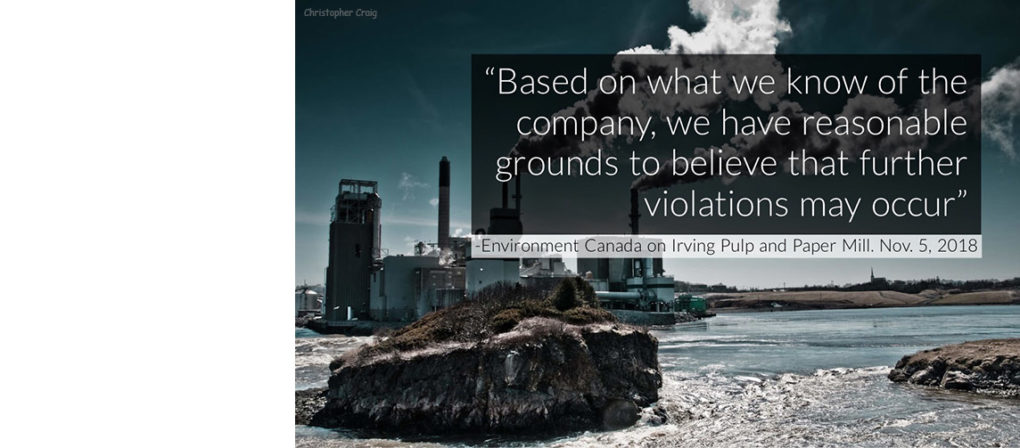
Part of Irving Pulp and Paper’s multi-million dollar fine for polluting the St. John River will not go toward a non-profit chaired by Jim Irving, who is also the mill’s co-CEO.
Judge David Walker accepted a new plea deal on Monday that will see a portion of the fine — $1.1 million — go to the Canadians River Institute. Another $2.4-million in penalties goes to the federal environmental damages fund for projects on the St. John, a national heritage river.
The original plea deal recommended $1.1 million go to CAST, a salmon conservation non-profit led by Irving. The proposed deal was met with immediate criticism from outside lawyers, including John Bird, a member of the Conservation Council’s board of directors, and our Fundy Baykeeper Matt Abbott, who told CBC it “didn’t pass the sniff test.”
Irving Pulp and Paper was charged in December 2016 with 15 violations of the federal Fisheries Act for dumping harmful effluent into the St. John River between June 2014 and August 2016.
The mill will now be added to the federal Environmental Offenders Registry.
Speaking to CBC, Environment Canada’s acting regional director, Robert Robichaud, said they’ll be watching Irving closely moving forward.
“Looking at the compliance history of Irving Pulp and Paper, they have been charged three times between 1999 and 2007,” he said. “We had 10 additional instances between 2014 and 16 and based on what we know of the company we have reasonable grounds to believe that further violations may occur in the future.”
Indeed.

“We shouldn’t forget that before reaching a plea deal, Irving Pulp and Paper began the process to challenge the constitutionality of the pollution test, a test that they failed 15 times,” says Fundy Baykeeper Matt Abbott.
“The test in question places fish in the effluent to see if most of those fish die. It is a test designed to answer the question “is this effluent really toxic?” And it has been used for decades to the benefit of all Canadians.
“Clearly, Irving Pulp and Paper doesn’t like our environmental laws, the very laws designed to protect our rivers, lakes and oceans,” Abbott says.
He welcomes and applauds Environment Canada’s commitment to watch past polluters in New Brunswick closely, noting it was Robichaud’s team that caught Cooke Aquaculture’s illegal use of pesticides that killed lobsters in the Bay of Fundy in 2009.

As for the new, accepted plea deal, Abbott says he’ll be watching to see if the fine monies awarded to CRI go toward projects in the area where damage occurred, the St. John River.
“Irving continues to claim that their pollution did not harm any fish in the wild. Indeed they went so far as to imply that they should be allowed to release highly toxic effluents and only be charged if someone finds dead fish,” Abbott says.
“They are, really, suggesting that we shouldn’t even be careful and prevent harm. They also ignore the fact that pollution causes harm even when we don’t see direct evidence of that harm. If fish, lobster, or anything else is weakened by the effluent we may never know. Dead fish can’t be caught in nets or on hooks; dead lobster don’t crawl into traps.
It is very likely that pollution from Irving Pulp and Paper harmed fish or other marine animals. Suggesting that there was no harm is at best uninformed and naive and at worst deliberately misleading and cynical.”
Recommended links

